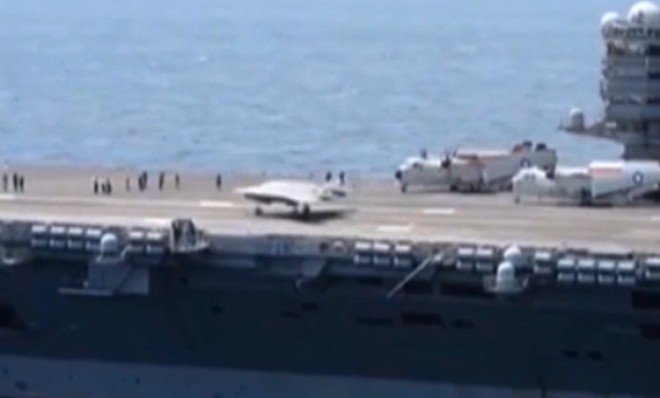WATCH: The Navy celebrates landing a drone on an aircraft carrier
A v-shaped, unmanned jet makes history


A free daily email with the biggest news stories of the day – and the best features from TheWeek.com
You are now subscribed
Your newsletter sign-up was successful
The Navy reached an aviation milestone on Wednesday when it successfully landed a fighter-jet-size, computer-guided drone on an aircraft carrier for the first time. "It is not often that you get a chance to see the future," Navy Secretary Ray Mabus said after watching the landing, "but that's what we got to do today."
The experimental X-47B "Salty Dog" jet took off from a Navy air base in Maryland, and flew to the U.S.S. George H.W. Bush, off the coast of Virginia. The drone touched down on the ship and deployed a tailhook to snag an arresting wire — the most difficult task for pilots landing on carriers.
The X-47B, one of two built by Northrop Grumman, scored another first in May when it was launched from the same carrier.
The Week
Escape your echo chamber. Get the facts behind the news, plus analysis from multiple perspectives.

Sign up for The Week's Free Newsletters
From our morning news briefing to a weekly Good News Newsletter, get the best of The Week delivered directly to your inbox.
From our morning news briefing to a weekly Good News Newsletter, get the best of The Week delivered directly to your inbox.
Military experts say it would be hard to overstate the significance of the achievement. "It's an historical moment," say Gordon Lubold and John Reed at Foreign Policy, "on par with the first flight Eugene Ely made off a ship in 1910."
The demonstration jets resemble v-shaped B-2 bombers but lack stealth capabilities. They are capable of carrying two precision-guided bombs. Now that the demonstration phase is over, the two test jets are headed for a museum, and the Navy is calling for proposals for the real thing: An armed, unpiloted aircraft that will be able to gather intelligence and launch attacks from carriers, all operated by a carrier's crew.
Critics say the cost — $1.4 billion for the test program alone — might not be worth it, since it's not clear whether carrier-based drones can do anything that land-based drones or piloted jets couldn't do cheaper. "When it comes to operating an unmanned aircraft from carrier decks, the Navy seems to be ambivalent about the whole idea," Loren Thompson of the Lexington Institute think tank tells The Associated Press.
Regardless, Lubold and Reed say at Foreign Policy, the Navy has good reason to celebrate. "In the span of a decade, the U.S. military has seen drones transform from primitive, propeller-driven flying lawnmowers to unmanned jets that incorporate all of the features of modern manned aircraft: speed, stealth, high-altitude, sensors, electronic gear, and the ability to carry smart, deadly weapons," they say. "And now, all that comes in an autonomous package that can be delivered via computer to a carrier at sea."
A free daily email with the biggest news stories of the day – and the best features from TheWeek.com
Harold Maass is a contributing editor at The Week. He has been writing for The Week since the 2001 debut of the U.S. print edition and served as editor of TheWeek.com when it launched in 2008. Harold started his career as a newspaper reporter in South Florida and Haiti. He has previously worked for a variety of news outlets, including The Miami Herald, ABC News and Fox News, and for several years wrote a daily roundup of financial news for The Week and Yahoo Finance.
